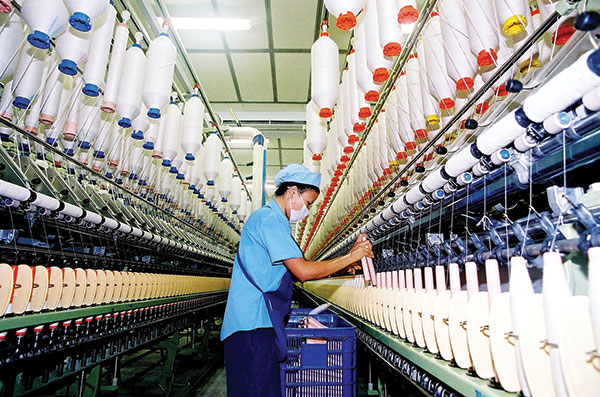Resolution19 is latest try at reform
 |
| With Resolution 19’s clearer targets and pronounced accountability, firms are likely to see a more business-friendly climate Photo: Le Toan |
The government last week issued its Resolution 19, the fourth of its kind over the past four years, in a bid to improve Vietnam’s economic competitiveness, with a focus on boosting administrative procedures.
“By late 2017, the Vietnamese business climate’s aggregate indices have to reach the average level of ASEAN+4 (Singapore, Thailand, Malaysia, and the Philippines),” the resolution states.
The resolution orders the reduction of time needed for processing many types of administrative procedures, such as payment of tax (to 119 hours a year) and social insurance (to 49 hours a year), licensing construction (to 63 days, down from the current 82 days), customs clearance (to 70 hours for exported goods, and 90 hours for imported goods).
The average time needed for a firm to connect with the state’s water supply sources must be halved to seven days, from the current 14 days.
In order to make this order feasible, the government also assigned specific tasks to ministries and agencies, who will have to report results to the government.
Raymond Mallon, economic advisor from the Australia-Vietnam economic reform programme, told VIR that Resolution 19 provides a useful framework for sustaining pressure on government agencies to implement reforms. It has appropriate objectives, a clear results framework, and specifies what agencies are accountable for achieving targeted results. The focus on achieving and/or surpassing ASEAN+4 standards provides a realistic framework for planning and assessing progress.
“The need to streamline administrative procedures is even more important because of the uncertain international environment and increasing protectionist pressures in key international markets,” Mallon said. “Resolution 19 reforms are consistent with reforms promoted under international agreements and should help ensure that Vietnamese society benefits more from international integration.”
According to Mallon, many of the targeted results will reduce the time and costs of conducting business. Reforms will also help contain corruption by reducing administrative discretion, or the process of “ask and give”.
“Reforming administrative procedures is especially important for small businesses with limited revenue over which to spread the overhead costs of cumbersome administrative procedures,” Mallon said.
Adam Sitkoff, executive director of the American Chamber of Commerce in Hanoi, told VIR that American businesses and investors “applaud” reform efforts that help create a more competitive environment where decisions are made faster, procedures are less complicated, rules are fairly enforced, and companies compete on their own merits, including for access to capital, land, and opportunities.
“We believe the business climate can best be helped by actions that increase productivity and reduce the costs and risks of doing business in Vietnam. Government efforts to address the challenges created by the over-complicated, restrictive, and unclear licensing and regulatory environment here are welcomed,” Sitkoff said.
Meanwhile, Hong Sun, general secretary of the Korea Chamber of Business in Vietnam, told VIR about the challenge for implementing Resolution 19.
“The biggest challenge is how to implement it effectively. It is not difficult to take measures, but quite difficult to turn the measures into specific actions,” Sun said.
“For example, while the government is trying to simplify administrative procedures, many types of sub-licences have been enacted in many localities. This has worried foreign firms in Vietnam,” he added.
| Business gets PM powwow The Vietnam-based business community will soon have its chance to raise issues and enquiries with the prime minister in a conference. The government and relevant ministries are making preparations for the organisation of the second conference between Prime Minister Nguyen Xuan Phuc and local and foreign invested enterprises in Hanoi. This meet will take place in late March, following the first conference in Ho Chi Minh City last April. The second conference is expected to be attended by leaders of the government and relevant ministries, and representatives from local and foreign business associations, local and foreign enterprises, and state-run groups and corporations. At the conference, Phuc will listen to businesses’ recommendations, and suggest fixes to their troubles. Deputy Prime Minister Vuong Dinh Hue said that the government will maximise its support to remove obstacles in doing business, via further simplification of administrative procedures, which will help reduce costs, time spent, and risks for enterprises. |
What the stars mean:
★ Poor ★ ★ Promising ★★★ Good ★★★★ Very good ★★★★★ Exceptional
Latest News
More News
- Hermes joins Long Thanh cargo terminal development (February 04, 2026 | 15:59)
- SCG enhances production and distribution in Vietnam (February 04, 2026 | 08:00)
- UNIVACCO strengthens Asia expansion with Vietnam facility (February 03, 2026 | 08:00)
- Cai Mep Ha Port project wins approval with $1.95bn investment (February 02, 2026 | 16:17)
- Repositioning Vietnam in Asia’s manufacturing race (February 02, 2026 | 16:00)
- Manufacturing growth remains solid in early 2026 (February 02, 2026 | 15:28)
- Navigating venture capital trends across the continent (February 02, 2026 | 14:00)
- Motivations to achieve high growth (February 02, 2026 | 11:00)
- Capacity and regulations among British areas of expertise in IFCs (February 02, 2026 | 09:09)
- Transition underway in German investment across Vietnam (February 02, 2026 | 08:00)
















 Mobile Version
Mobile Version